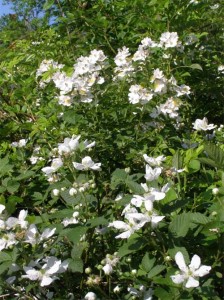Blackberry winter flower competition
By Ken Moore
For years, I was aware of the common wild blackberry, Rubus argutus, around the Fourth of July, when, along roadsides and fencerows, they were pickin’-ripe for cobblers and ice cream toppings. Now I look forward to blackberries earlier, when they begin flowering during the cool temperatures of early May, the season that old timers call “blackberry winter.â€
On a walk around the Botanical Garden’s Mason Farm Biological Reserve, I was enjoying the edges of flowering blackberries, when I came upon one edge where a mound of the invasive exotic multiflora rose, Rosa multiflora, was vigorously competing for space with the blackberry. Not only was space an issue between these two competing plants, but the presence/absence of pollinators was dramatic. There in the warm late-morning sun, all the honey bees and other pollinators were covering the flowers of the exotic rose. No pollinators were visiting flowers of the adjacent blackberry.
Now, I’m not an expert on honey bees or pollination ecology, but if this spreading and high-climbing rose is out-competing our delicious wild blackberries in attracting pollinators, we have a serious problem.
Before I proceed with my usual tirade against invasive exotics, let me acknowledge that a friend of mine frequently criticizes me for being negative every time I mention an exotic plant. In defense, I have no objections to the numerous exotic garden plants that do not freely jump the garden fence to out-compete native plants in the wild. I do recommend vigorous battle against recognized destructive exotics like the privets, eleagnus, oriental wisterias, Japanese honeysuckle and kudzu, as well as the multiflora rose.
The foreigners growing so happily here, without their homeland diseases and predators to keep them in check, each year cause millions of dollars of damage to natural areas and horticultural crops.
If the multiflora rose receives preferred pollination over the blackberry, the greater production of rose hips, spread far and wide by birds and other animals, will result in less area available for colonization by blackberries and other native species. Numerous native butterfly species and other wildlife are critically dependent on specific native plants; much of the plant-specific native fauna is not adapted to utilize the invading exotic flora.

Flowers of multiflora rose at top compete for pollinators with blackberry flowers, below. Photo by Ken Moore.
Along our roadsides and forest edges, blackberries and multiflora roses are making quite a show now. From a distance, the plants are similar. Both are thorny and form impenetrable thickets. But only the rose can climb high in trees and scramble over shrubs and small trees, giving it a physical advantage. The flowers are similar, but a closer look will reveal the rose flowers are smaller and in tighter, roundish conical clusters with yellow stamens. In contrast, flowers of blackberries are larger, in looser horizontal clusters, and the stamens are not yellow. Sadly, it may be that, offered a choice, the pollinators prefer the rose.
If you are cultivating blackberries, you certainly don’t want the multiflora rose near by. Without blackberries, you still don’t want this climbing rose nearby. Please do the right thing and take advantage of this cool blackberry winter and cut and grub out all the multiflora rose within your domain.



Comments are closed.